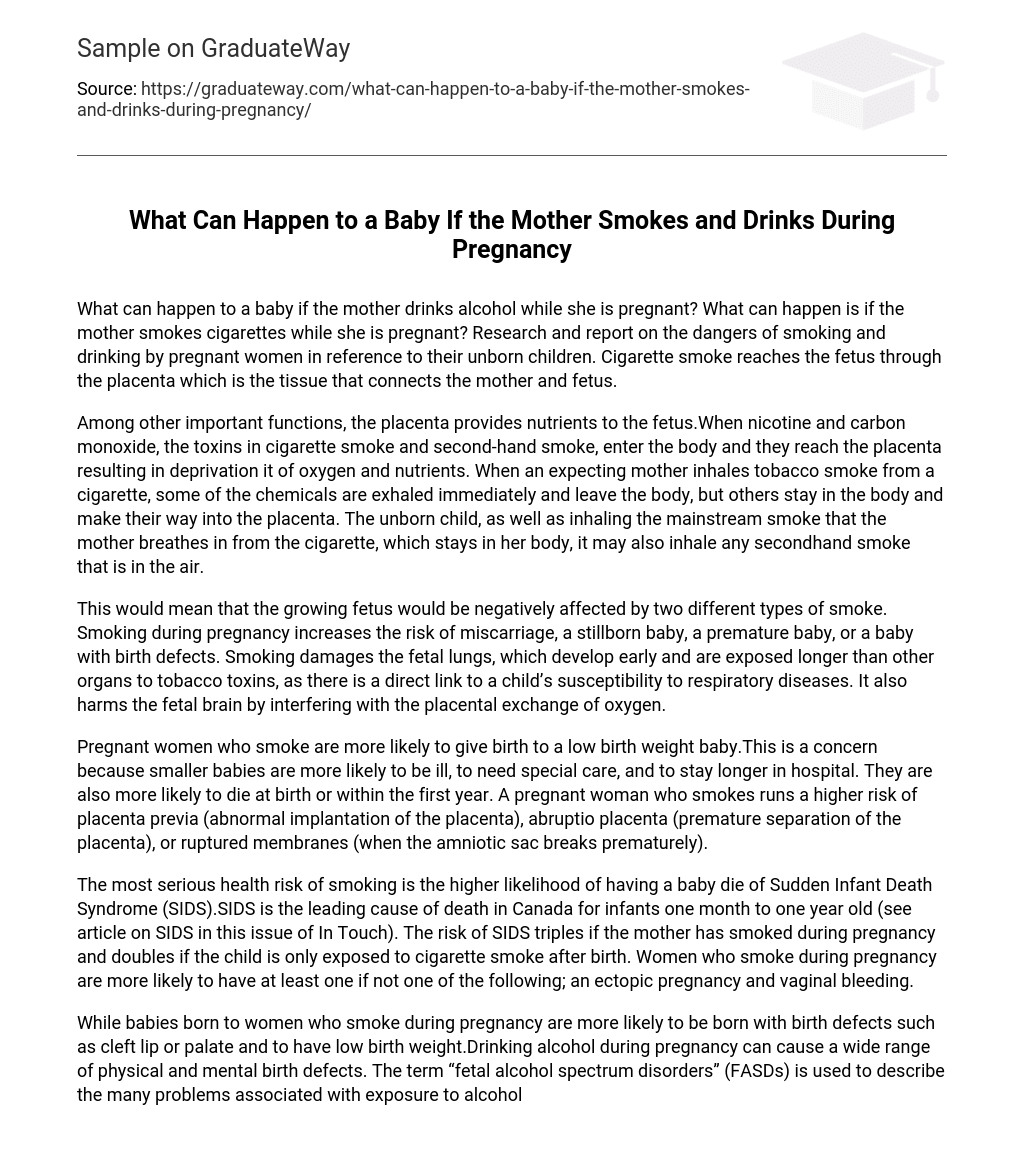What can happen to a baby if the mother drinks alcohol while she is pregnant? What can happen is if the mother smokes cigarettes while she is pregnant? Research and report on the dangers of smoking and drinking by pregnant women in reference to their unborn children. Cigarette smoke reaches the fetus through the placenta which is the tissue that connects the mother and fetus.
Among other important functions, the placenta provides nutrients to the fetus.When nicotine and carbon monoxide, the toxins in cigarette smoke and second-hand smoke, enter the body and they reach the placenta resulting in deprivation it of oxygen and nutrients. When an expecting mother inhales tobacco smoke from a cigarette, some of the chemicals are exhaled immediately and leave the body, but others stay in the body and make their way into the placenta. The unborn child, as well as inhaling the mainstream smoke that the mother breathes in from the cigarette, which stays in her body, it may also inhale any secondhand smoke that is in the air.
This would mean that the growing fetus would be negatively affected by two different types of smoke. Smoking during pregnancy increases the risk of miscarriage, a stillborn baby, a premature baby, or a baby with birth defects. Smoking damages the fetal lungs, which develop early and are exposed longer than other organs to tobacco toxins, as there is a direct link to a child’s susceptibility to respiratory diseases. It also harms the fetal brain by interfering with the placental exchange of oxygen.
Pregnant women who smoke are more likely to give birth to a low birth weight baby.This is a concern because smaller babies are more likely to be ill, to need special care, and to stay longer in hospital. They are also more likely to die at birth or within the first year. A pregnant woman who smokes runs a higher risk of placenta previa (abnormal implantation of the placenta), abruptio placenta (premature separation of the placenta), or ruptured membranes (when the amniotic sac breaks prematurely).
The most serious health risk of smoking is the higher likelihood of having a baby die of Sudden Infant Death Syndrome (SIDS).SIDS is the leading cause of death in Canada for infants one month to one year old (see article on SIDS in this issue of In Touch). The risk of SIDS triples if the mother has smoked during pregnancy and doubles if the child is only exposed to cigarette smoke after birth. Women who smoke during pregnancy are more likely to have at least one if not one of the following; an ectopic pregnancy and vaginal bleeding.
While babies born to women who smoke during pregnancy are more likely to be born with birth defects such as cleft lip or palate and to have low birth weight.Drinking alcohol during pregnancy can cause a wide range of physical and mental birth defects. The term “fetal alcohol spectrum disorders” (FASDs) is used to describe the many problems associated with exposure to alcohol before birth. Each year in the United States, up to 40,000 babies are born with FASDs.
The most severe of these effects is fetal alcohol syndrome (FAS), a combination of physical and mental birth defects FASDs effects range from mild to severe and include effects include mental retardation; learning, emotional and behavioral problems; and defects involving the heart, face and other organs.Babies with FAS are abnormally small at birth and usually do not catch up on growth as they get older. They have characteristic facial features, including small eyes, a thin upper lip and smooth skin in place of the normal groove between the nose and upper lip. Their organs, especially the heart, may not form properly.
Many babies with FAS also have a brain that is small and abnormally formed. Most have some degree of mental disability. Many have poor coordination, a short attention span and emotional and behavioral problems.Drinking alcohol during pregnancy increases the risk for miscarriage and premature birth (before 37 completed weeks of pregnancy).
Studies also suggest that drinking during pregnancy may contribute to stillbirth. A 2008 Danish study found that women who binge drink three or more times during the first 16 weeks of pregnancy had a 56 percent greater risk for stillbirth than women who did not binge drink. Another 2008 study found that women who had five or more drinks a week were 70 percent more likely to have a stillborn baby than non-drinking women.The term ARBDs describes physical birth defects that can occur in many organ systems, including the heart, liver, kidneys, eyes, ears and bones.
The term ARNDs describes learning and behavioral problems associated with prenatal exposure to alcohol. These problems can include learning disabilities; difficulties with attention, memory and problem solving; speech and language delays; hyperactivity; psychological disorders and poor school performance. Children born with ARBDs and ARNDs do not have the characteristic facial features associated with FAS.Referencehttp://www.helpwithsmoking.com/smoking-and-pregnancy/effects-on-foetus-pregnancy.phphttp://hubpages.com/hub/Smoking-Facts





